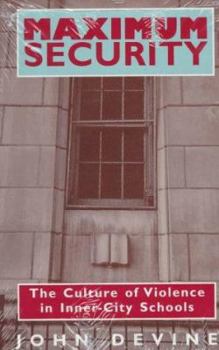Maximum Security: The Culture of Violence in Inner-City Schools
Select Format
Select Condition 
Book Overview
Escalations in student violence continue throughout the nation, but inner-city schools are the hardest hit, with classrooms and corridors infected by the anger, aggression, and criminality endemic to street life. Technological surveillance, security personnel, and paramilitary control tactics to maintain order and safety are the common administrative response. Essential educational programs are routinely slashed from school budgets, even as the number of guards, cameras, and metal detectors continues to multiply. Based on years of frontline experience in New York's inner-city schools, Maximum Security demonstrates that such policing strategies are not only ineffectual, they divorce students and teachers from their ethical and behavioral responsibilities. Exploring the culture of violence from within, John Devine argues that the security system, with its uniformed officers and invasive high-tech surveillance, has assumed presumptive authority over students' bodies and behavior, negating the traditional roles of teachers as guardians and agents of moral instruction. The teacher is reduced to an information bureaucrat, a purveyor of technical knowledge, while the student's physical well-being and ethical actions are left to the suspect scrutiny of electronic devices and security specialists with no pedagogical mission, training, or interest. The result is not a security system at all, but an insidious institutional disengagement from the caring supervision of the student body. With uncompromising honesty, Devine provides a powerful portrayal of an educational system in crisis and bold new insight into the malignant culture of school violence.
Format:Paperback
Language:English
ISBN:0226143872
ISBN13:9780226143873
Release Date:January 1997
Publisher:University of Chicago Press
Length:296 Pages
Weight:0.90 lbs.
Dimensions:0.7" x 5.9" x 8.9"
Customer Reviews
1 rating
A good book that might have been even better
Published by Thriftbooks.com User , 15 years ago
First, ignore the author's early forays into post-modernism. Second, forgive him for relying unduly heavily on minimally trained graduate students for most of his field work. Given these two conditions, this is a really valuable book. Twelve years after Maximum Security was written, it may seem obvious that adolescents join gangs, offer an actively menacing countenance, and are sometimes violent simply because they have to be to survive in America's inner city schools. In 1997, however, this was an illuminating observation that explained a great deal. Devine made clear, moreover, that it was not the organization and functioning of schooling itself which engendered a culture of violence, but that it was a contextually determined phenomenon, inevitably imported from the outside, about which schools could do very little. Devine also clarified the socially determined role of the teacher in lower-tier inner-city schools where a culture of violence prevails. Teachers cease to be involved in students' lives. They close the doors to their classrooms and, as best they can, impart specific subject matter. The whole student is no longer their concern, because an holistic approach involves contact with too many outside sources of real danger. Devine's account of the hopelessness that comes with being relegated to a lower tier school is familiar, reminiscent of the massive literature on school stratification and its pernicious effects. Though the social costs of educational stratification are well known, however, Devine makes clear that it still pervades big-city schools such as those he studied in New York. A welcome but unexpected observation concerns bigness itself. When several thousand students with very limited prospects are concentrated in one school, opportunities for parental and neighborhood involvement are, for all practical purposes, eliminated. Schools become large holding tanks, suffused with fear, normatively chaotic, and devoid of regulation by any wholesome notion of belonging to a nurturing community. So, if we ignore Devine's efforts to make post-modernism useful and forgive him his methodologically dubious approach, we can learn a great deal about big-city schooling. Anyon's Ghetto Schooling, published in the same year as Maximum Security, is a useful complement to Devine's work.






